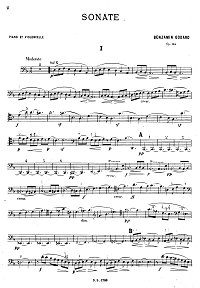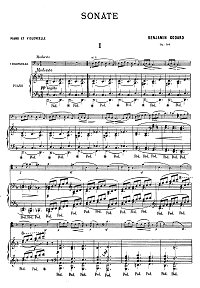Godard - Cello sonata op.104
|
Godard - Cello sonata op.104. You can download the PDF sheet music Godard - Cello sonata op.104 on this page.
Sonata for cello and piano in D minor, Op.104
1. Moderato
2. Adagio non troppo
3. Vivace ma non troppo - Andante - Vivace - Moderato
Godard's D minor Cello Sonata has a visible influence of Schumann. To the modern listener, unconcerned with the claims of novelty, it leads to a blend of strong bass lines and mildly chromatic harmony which sits well with Godard's pleasing melodic gift. In the first movement, his operatic leanings come out in a number of changes of texture and dynamics, especially in some low, chromatic swirls. Strong bass lines are again evident in the central slow movement, as is a partiality for the major third in the melody. The last movement is the most complex, with three main themes, the third of them a passionate tune high on the cello which any tenor would give his eye-teeth for. The almost patriotic tone of the ending again recalls Schumann music.
To download PDF, click the "Download PDF" button below the appropriate sheet music image.
To view the first page of Godard - Cello sonata op.104 click the music sheet image.
|
| PDF format sheet music |
|
|
|
Instrument part: 12 pages. 584 K
|
Piano part: 45 pages. 2501 K
|
 |
 |
|
|
| Download PDF (14.99
€) |
Download PDF (14.99
€) |
|
Born in 1849, Benjamin Godard studied at the Conservatoire, taking violin lessons from the famous virtuoso Henri Vieuxtemps. This solid start bore fruit finally in the dramatic symphony Tasso, which won him the Paris City Composition Prize in 1878. In 1887 he was appointed as a composition professor at the Conservatoire and retained the post until his death seven years later at the age of only forty-five.
At that time, he was regarded as a highly successful composer. Symphonies and concertos of his were regularly performed in Paris concerts and, for the less flashy denizens of the salons, there were any number of charming piano pieces, like the well-known Chemin faisant (Travelling along'). Although he completed eight operas, none of them really caught fire.
The serious, fashion-conscious Parisian music-lover did not warm to Godard's traditional musical language. Although, relates to the quality of his chamber music, a genre to which, like many French composers of the 1870s and 1880s, he brought a seriousness to the chamber music genre, informed by his excellent technical training. |
|